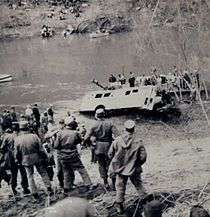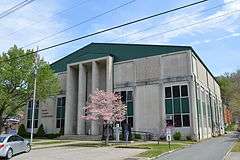Prestonsburg, Kentucky, bus disaster
The collision and plunge into Big Sandy River involving a school bus near Prestonsburg, Kentucky, on February 28, 1958, resulted in the deaths of 26 students and the bus's driver. It was the third-deadliest bus crash in United States history, tied for fatalities with the Carrollton, Kentucky bus collision in 1988. The only deadlier crashes were a 1963 bus-train crash in Chualar, California and the 1976 Yuba City bus disaster, which claimed the lives of 29 people.
| Prestonsburg, Kentucky, bus disaster | |
|---|---|
 | |
| Details | |
| Date | February 28, 1958 |
| Location | Prestonsburg, Kentucky |
| Statistics | |
| Bus | School bus |
| Vehicles | tow truck |
| Passengers | 49 |
| Deaths | 27 |

Summary
On a cold and cloudy morning, after a period of heavy rains and thaw, a Floyd County school bus loaded with 48 elementary and high school students bound for school in Prestonsburg, Kentucky, struck the rear of a wrecker truck on U.S. Route 23 and fell down an embankment into the swollen waters of the Levisa Fork of the Big Sandy River, where it was swept downstream and submerged.[1]
Twenty-two children escaped the bus in the first few minutes as it became fully submerged in the raging flood stage waters and made it safely out of the river. However, 26 other children and the bus driver drowned. National Guard and other authorities and agencies responded. The bus was finally located by Navy divers, and removed from the river 53 hours later.[1]
Several months later, two American recording artists released songs about the crash: The Stanley Brothers, with "No School Bus in Heaven," and Ralph Bowman, with "The Tragedy of Bus 27." Neither made the national Billboard Hot 100 charts, but they did receive regional airplay in some parts of the country.
The crash would become the impetus behind the formation of the Floyd County Emergency & Rescue Squad, founded by volunteers on April 27, 1958. To this day, the FCERS remains a 100% volunteer agency, and assists local police departments, volunteer fire departments, and EMS with auto extrication, search and rescue, fireground support, and EMS first response in addition to its original role as the primary water rescue agency for the area.
The 27-person death toll is tied with the Carrollton bus disaster in 1988 for the third highest number of fatalities resulting from a bus crash. Both happened in Kentucky and in each, the victims were all thought to have survived the initial collisions, but were unable to safely evacuate the school-type buses afterwards. After the 1988 crash, Kentucky changed its public school bus equipment requirements and requires a higher number of emergency exits than any other state or Canadian province.
In recent years the accident has been the subject of two documentary films, The Very Worst Thing and A Life of Its Own, and the site of the bus accident has been marked by a sign bearing a dark image of a school bus superimposed with the names of the children and driver that died. There is usually a wreath of plastic flowers on the guardrail in front of the sign, which is located on Route 1428 (old US 23) 0.6 miles (0.97 km) east of the intersection of Route 302.
See also
- Wayne Corporation – History of a different school bus manufacturer with information about bus safety engineering
References
- "Beneath the Big Sandy". TIME Magazine. 71 (10): 17. 10 March 1958. ISSN 0040-781X.
- Prestonsburg School Bus Crash
- Big Sandy Bus Accident 1958
- Copley, Rich (February 21, 2010). "Film depicts an Appalachian tragedy; Documentary recalls 1958 school bus crash that killed 26 children in Floyd County". kentucky.com. Lexington Herald-Leader. Retrieved January 22, 2015. (Archive.is link)
- Floyd County Emergency & Rescue Squad History